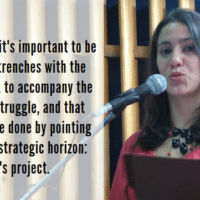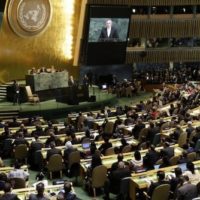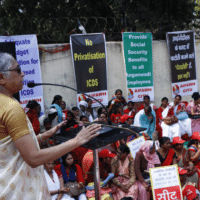-
Phony progressives follow Trump lead on Venezuela
So-called progressives sound just like Donald Trump when they describe Venezuela’s elected government as a “dictatorship,” said Nicholas Evan Ayala, co-editor of Anti-Conquista. “A lot of Democrats pretend to be anti-war, yet fail to see that every intervention they advocate follows a long history of US evil…leading to the deaths of millions of people,” said Ayala.
-
The U.S. armed and funded extremists in Syria
The US armed and funded extremists in Syria to overthrow the Syrian government and the media cheered. Those same extremists then attacked the Kurds on Turkey’s behalf to the horror of the same media. Now what?
-
More than 30,000 teachers and staff strike in Chicago, Illinois
Pickets appeared at Chicago Public Schools city-wide Thursday morning as 32,000 teachers and staff struck for the first time since 2012. Educators are fighting for smaller class sizes and more nurses, librarians, social workers and other support staff, along with increased spending to improve conditions in all schools.
-
Socialist feminism and the Communal State
Blanca Eekhout is the Minister of People’s Power for the Communes and Social Movements of Venezuela and a woman linked to revolutionary militancy long before President Hugo Chávez came to power, whose team she was part of.
-
Grassroots Communication fights back! A conversation with Jessica Pernia
A founding member of Tatuy TV speaks about what it means to be a group of revolutionary journalists in hard times.
-
What the New Deal can teach us about winning a Green New Deal: Part V—summing up the New Deal experience
Growing awareness of our ever-worsening climate crisis has boosted the popularity of movements calling for a Green New Deal. At present, the Green New Deal is a big tent idea, grounded to some extent by its identification with the original New Deal and emphasis on the need for strong state action to initiate social-system change on a massive scale. Challenges abound for Green New Deal activists.
-
Denmark’s Red-Greens: what answers when the climate crisis shakes up politics?
In 2007, Søndergaard was elected as a Member of the European Parliament for the People’s Movement against the European Union (EU). After resigning this position in 2014, he won election to the Danish parliament in 2015 as an RGA MP for Gladsaxe: he was re-elected in the June 5 general election this year.
Søndergaard spoke with Green Left Weekly European correspondent Dick Nichols after the RGA’s 30th Annual Meeting, held in Copenhagen on October 5-6.
-
Back to the wall
The same American myths that drove frontier expansion now support closing the borders.
-
Marx on the metabolic rift: how capitalism cuts us off from nature
Although Karl Marx is not known first and foremost as an environmental theorist, in recent decades students of his work have argued that Marx had a systematic approach to environmental protection, that he recognized the key connections among labor, technology, and nature, and, according to sociologist John Bellamy Foster, that his discussions of the environment “prefigured some of the most advanced ecological analysis of the late 20th century.”
-
No Depression in Heaven with Alison Collis Greene
In this episode of Money on the Left, we speak with historian Alison Collis Greene about her book No Depression in Heaven with an eye toward contemporary debates around the Green New Deal. Subtitled The Great Depression, the New Deal, and the Transformation of Religion in the Delta, Greene’s book critiques what she calls the […]
-
FX & Imperialism
What affects the exchange rate of a country’s currency? The answer depends on where that country stands in the world economy. Not simply because an exchange rate is the value of one currency versus another, so that you must weigh up two or more countries.
-
Impeachment watch
In their crusade to get Trump and distract from their own corruption, the Democrats have moved on from Russiagate to an impeachment inquiry over “Ukrainegate.”
-
It is time to try out an “ecological Leninism” – Interview with Andreas Malm
Andreas Malm interviewed about Marxist approaches to the climate movement.
-
It’s time to add global justice to XR’s demands
Extinction Rebellion must recognise the impacts of colonialism and capitalism, and demand a just transition for all, argues Aranyo Aarjan
-
The Berlin Wall thirty years later
Even thirty years have not accustomed all ex-GDR citizens to seeing youngsters in the streets with their ragged dogs and paper cups for charitable donations, concert violinists begging money with Mozart in cold subway stations or, on icy nights, homeless huddled figures in sleeping bags on the stations’ concrete floors.
-
Defying repression, tens of thousands of Ecuadorians take part in national strike
The heavy-handed response of the Ecuadorian police and military to the massive mobilizations in the country has already cost eight lives with hundreds suffering grave injuries
-
If you take away freedom, all four seasons and I will die
Turkey has invaded Syria. In particular, Turkey has crossed the border to destroy the largely Syrian Kurdish province of Rojava, south of the Turkey-Syria border and east of the Euphrates River. The green light for this invasion came from Washington, DC, when U.S. President Donald Trump told Turkish President Recep Tayyip Erdogan that the U.S. would withdraw its troops from the area.
-
The two faces of the UN
The 74th UN General Assembly (UNGA) has shown, schematically speaking, two groups of countries. Both, with dissimilarities among their members, but with common interests each, they form today’s world.
-
A green Earth with peace and room for us all
Draft Globalization programme submitted by the National Board of the Red-Green Alliance/Enhedslisten, Denmark, to the party’s next Annual Congress on 5 – 6 October. It is a programmatic text about global development.
-
Navigating Educational Empowerment Through Life Conditions: A Study of Rural Women in Indian Punjab
Though the voices of rural women in India are some of the least heard, they are not mere passive victims. Many rural women strongly condemn their marginalization and pauperization—highlighting the flawed and biased developmental polices of the state, which they hold largely responsible for their hardships.




















